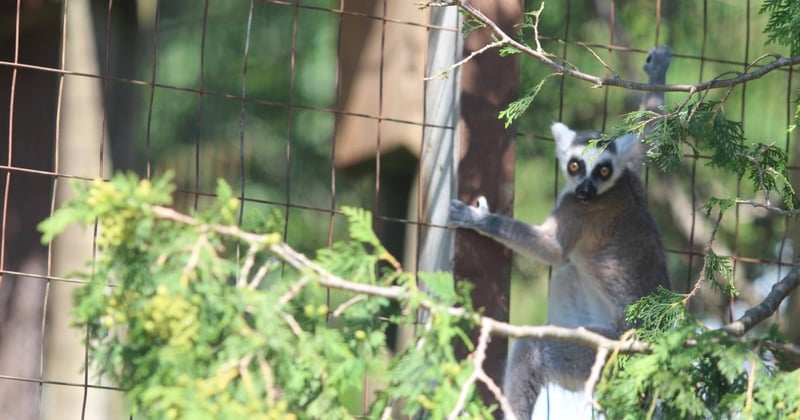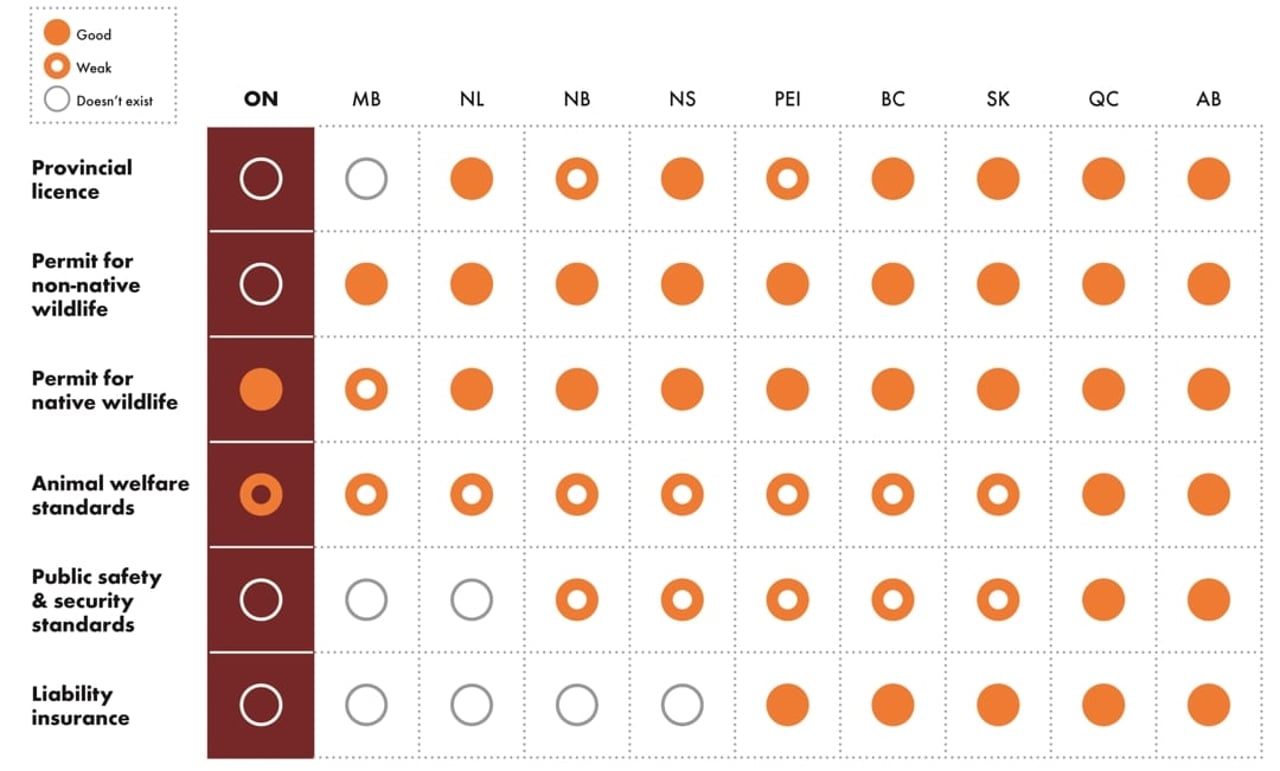
Join us in calling on the Ontario government for stronger provincial regulations, meaningful enforcement and making this year, the last year for roadside zoos
Ontario ranks dead last, compared to other Canadian provinces, for not having any provincial zoo-licencing system, permit system for non-native species, public safety and security standards nor a requirement for liability insurance for zoo operators.
(Click scorecard to expand view)
“In Ontario, you don’t need expertise, a reason or a licence to operate a zoo or buy dangerous animals like a tiger or lion,” said Michèle Hamers, World Animal Protection’s Wildlife Campaign Manager. “This is why Ontario ranks dead last and why we are working with the government to get this done for once and for all. We are pushing the province to implement what other provinces like Alberta and Quebec have done already. We want to see a mandatory province-wide zoo-licencing system and meaningful and enforceable standards to safeguard animal welfare and public health and safety.”
Our latest estimates suggest there are around 30 roadside zoos in Ontario, covering well-known locations to small backyard operations, but excluding known private collections of wild animals. Ontario has the largest number of roadside zoos in Canada, and yet, no tracking of how many of these facilities exist or the types of animals they house. This is despite thousands of wild, and often extremely dangerous animals, being kept in these facilities for entertainment purposes in conditions that often put the animals and the public at risk.
From the recent concerning animal deaths at Marineland, including Kiska the orca, to Reptilia opening in London despite a by-law banning the display of many of their species, these are just some examples that highlight how broken the system is in Ontario.
Our ongoing work has been driving the province to launch investigations at these facilities, but the patchwork system, where non-compliance is the norm, needs to stop, once and for all.
It's why we are calling on all political parties to come together to pass meaningful legislative changes and end the culture of non-compliance by making this year the last year for roadside zoos in this province.
The passing of the Provincial Animal Services (PAWS) Act in 2019 was a step in the right direction but there has been no government action on addressing the remaining significant welfare and safety regulatory gaps around captive wildlife in the province.
The Toronto Zoo, as well as the Association of Municipal Managers, Clerks and Treasurers of Ontario (AMCTO), and Municipal Law Enforcement Officers' Association (MLEOA) have joined efforts led by World Animal Protection to bring change to Ontario's broken model.
"While the PAWS Act has taken important steps, there continue to be far too many exotic animals in sub-optimal conditions in private ownership and in unaccredited roadside zoos across our province," said Dolf DeJong, Chief Executive Officer of the Toronto Zoo.
Ontario only bans the ownership of select native species - but the regulation of thousands more wild non-native species including tigers, lions, and venomous snakes has been downloaded onto municipalities, leading to a patchwork of rules and regulations.
It's estimated that approximately 50% of municipalities in the province don't have any bans on wild animal ownership.
"Municipalities in Ontario have continued to face challenges in managing unregulated exotic animals and the presence of 'roadside zoos' which have posed safety risks to the public and to enforcement officers. We encourage the province to develop a mandatory licencing regime and take action to minimize the operational, financial and legal risks to the municipal sector." said Elana Arthurs, Chief Administrative Officer (CAO) at Township of Douro-Dummer and President of the Association of Municipal Managers, Clerks and Treasurers of Ontario (AMCTO).
"To address public safety and to reduce the risks faced by bylaw officers who are often called upon to respond to exotic animal concerns, the Municipal Law Enforcement Officers' Association supports World Animal Protection in their advocacy for the development of a provincial framework to create a uniformed approach to regulation and enforcement of exotic animals and roadside zoos," added Doug Godfrey, President, Municipal Law Enforcement Officers' Association.
World Animal Protection has been campaigning for over 50 years to push all levels of government to create tighter regulations as it relates to animal welfare. This includes banning the private ownership of wild animals and regulations that would result in the phase out of roadside zoos, keeping only those facilities that can meet the highest animal welfare and public safety standards.
Speak out for captive wildlife in degrading roadside zoos
Join us and take this moment to speak out for the captive wild animals in Ontario. Show the Ontario Solicitor General that Canadians are concerned about this and urge him to act.
Send an e-letter to Ontario’s Solicitor General now!
